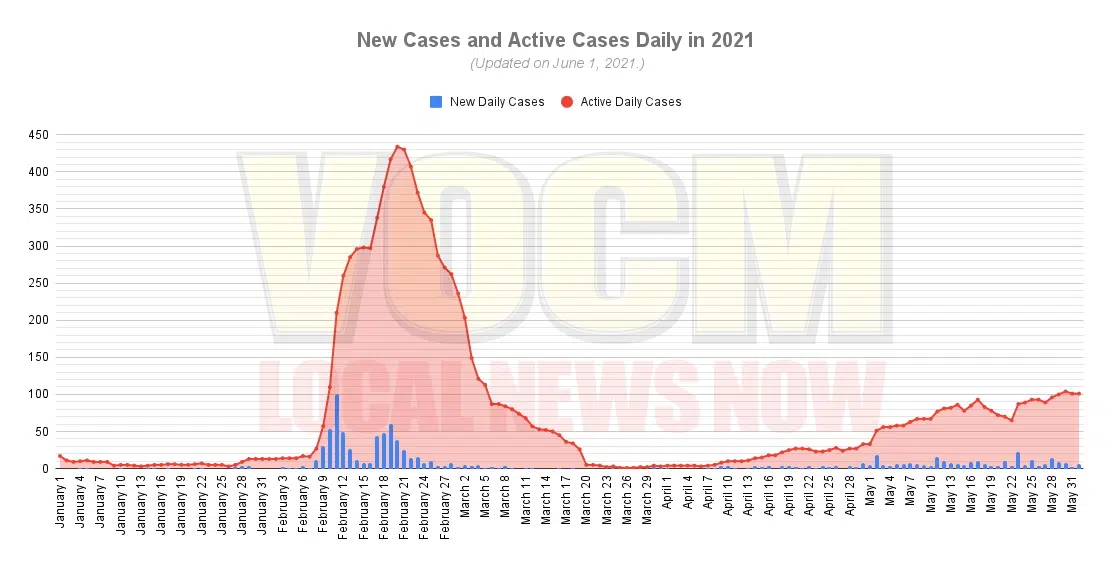The Province of Newfoundland and Labrador is under a Public Health Emergency due to COVID-19. The declaration was made on March 18, 2020.
On March 11, 2020, the World Health Organization assessed the COVID-19 outbreak as a pandemic. Information on the Government of Canada’s response to COVID-19 is available at this link.
Northeast and Central Newfoundland are under Alert Level 3.
St. George’s – Stephenville – Port au Port area is under Alert Level 4.
The rest of the province is under Alert Level 2.
The province is currently reporting 1,317 cases of COVID-19. There have been six deaths related to the virus.
Full information on the measures is available at the provincial government’s COVID-19 website.

The province of Newfoundland and Labrador is working through its phased COVID-19 vaccination plan, beginning with those who are most at risk for severe illness.
Find out who is currently eligible for vaccination in your regional health zone, and book your appointment online or by telephone at this link: COVID-19 – Get the Shot
Details on the province’s COVID-19 immunization plan are online at this link: COVID-19 Immunization Plan for Newfoundland and Labrador
![]()

Updated March 27, 2021
Update: Details on restrictions under Alert Level 4 are available at this link.
View Public Health Guidance for All Alert Levels via the Government of NL’s website.
Public Spaces and Gatherings:
- Formal gatherings run by a recognized business or organization are limited to no more than 50 people. Physical distancing must be maintained.
- Public visitations are permitted, with one household bubble visiting at a time. Wakes are prohibited.
- Informal gatherings are limited to only those in your Steady 20.
Recreational Activities:
- Outdoor playgrounds and equipment can be used, where owner/operators allow.
- Gym and fitness facilities, yoga studios, swimming pools, tennis and squash facilities, arenas, and dance studios are permitted to open, in accordance with guidelines.
- Group and team sport, arts and recreation activities are permitted, in accordance with guidelines.
- Performance spaces can open with a maximum capacity of 50 people. Physical distancing must be maintained.
Health care services:
- Private health care clinics can open in accordance with guidelines.
- Visitor restrictions for acute care, long term care, personal care homes, community care homes, and assisted living facilities are in accordance with the Guidelines for Support Persons/Designated Visitors.
Businesses and Services:
- Child care services can operate at full capacity.
- Retail stores, including those in shopping malls, can open at reduced capacity. Physical distancing must be maintained.
- Personal service establishments, including spas, esthetic services, hair salons, body piercing, tattooing and tanning salons, can open in accordance with guidelines.
- Restaurants can open for in-person dining at 50 per cent capacity as long as physical distancing can be maintained between patrons seated at adjacent tables. Buffets are prohibited.
- Bars and lounges are permitted to open at 50 per cent capacity, in accordance with guidelines.
- Cinemas and bingo halls are permitted to open with a maximum capacity of 50 people per room. Physical distancing must be maintained.
Full information on the measures is available at the provincial government’s COVID-19 website.
The Public Health Agency of Canada says COVID-19 is a serious health threat, and the risk to Canadians is considered high. Those aged 65 and over; those with compromised immune systems; and those with underlying medical conditions are at an increased risk.
People are being advised to exercise physical distancing.
View the current list of travel health notices at this link.
People infected with COVID-19 may experience few or no symptoms. Several of the symptoms present similarly to those of a cold or a flu.
The Public Health Agency of Canada suggests that people self-monitor for symptoms related to COVID-19. Symptoms may take up to 14 days to appear after exposure to the virus.
Symptoms surrounding COVID-19 include:
- Fever (including chills/sweats);
- Cough (new or worsening);
- Shortness of breath or difficulty breathing;
- Runny, stuffy or congested nose (not related to seasonal allergies or other known causes/conditions);
- Sore throat or difficulty swallowing;
- Headache;
- Acute loss of sense of smell or taste;
- Unusual fatigue, lack of energy;
- New onset of muscle aches;
- Loss of appetite;
- Vomiting or diarrhea for more than 24 hours; or
- a child displaying small red or purple spots on hands and/or feet
Even if you have mild symptoms, stay home and contact the public health authority (811 in Newfoundland and Labrador) for further information and advice.
Read further information regarding symptoms via the Government of NL’s COVID-19 site at this link.
Public Health Agency of Canada says coronaviruses are commonly spread from an infected person through respiratory droplets when you cough or sneeze, close or prolonged personal contact, and touching something with the virus on it, then touching your mouth, nose or eyes before washing your hands.
To help prevent spreading the illness:
- Stay informed, be prepared and follow public health advice;
- Wash your hands with warm water and soap for at least 20 seconds;
- Use an alcohol-based hand sanitizer in the absence of soap and water;
- Do not touch your face;
- Cough or sneeze into your sleeve or a tissue;
- Maintain physical distancing;
- Wear a non-medical mask or face covering when you are in public and unable to maintain physical distancing;
- Increase cleanliness and ventilation of public spaces and worksites;
- If you are sick, stay home and avoid contact with others;
- Work from home, where possible; and
- Shop online and use curbside pick-up, where possible.
Travel restrictions are currently in effect for the province of Newfoundland and Labrador. Entry is only permitted if your purpose of traveling meets the following conditions:
You are:
- A resident of Newfoundland and Labrador or a resident of another Atlantic Province (Newfoundland and Labrador, Nova Scotia, New Brunswick, and Prince Edward Island);
- An essential worker;
- A resident of St. Pierre and Miquelon requiring health care; and
- An individual who meets the criteria approved by the Chief Medical Officer of Health.
The list of possible exemptions which may be approved by the Chief Medical Officer of Health are available at this link.
Guidelines on entry to Newfoundland and Labrador can be found at the Government of NL’s website.
The Government of Canada has published official guidelines on travel advice at this link.
-
- Stay home and self-isolate
- Contact your health care provider or public health authority if you’re exhibiting symptoms similar to COVID-19 (fever, shortness of breath, coughing, etc.)
- Avoid those in hospitals and long-term care centres
- Avoid having visitors to your home
- Cover your mouth when coughing and sneezing
- Have supplies delivered to your home instead of running errands.
- The PHAC encourages having deliveries dropped off outside, ensuring a 2-metre distance
Advice on how to self-isolate can be found at this link, courtesy the Government of Canada.
Be sure to set a plan in place, and prepare before anyone in your house falls sick.
If you or a loved one are feeling overwhelmed during the COVID-19 pandemic, there are several resources in place that are available to offer remote assistance.
Consider contacting:
- The Mental Health Crisis Line at (709) 737-4668 or 1-888-737-4668
- The Kids Help Line at 1-800-668-6868 or text 686868
- CHANNAL’s Warm Line at 1-855-753-3560
- Visit Bridge the gApp at www.bridgethegapp.ca
























